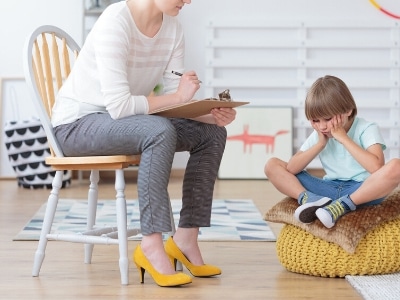Autism characteristics: a checklist for primary school age children
School can be a busy environment for children. There are generally long, unstructured days, lots of verbal information to process, other children to navigate interactions with, boisterous playground activity to negotiate and different sights, sounds, smells and noises to process.
For some children – particularly those on the autism spectrum – these experiences can be challenging and sometimes overwhelming.
Some children on the spectrum are often diagnosed during their primary school years, when it becomes more obvious that their communication, social interaction and behavioural characteristics are unique to those of their peers.
Children on the spectrum may find it challenging to make friendships, take part in conversations or find common interests with other children.
A few questions relating to your child’s development in their pre-school years, may have been raised. These questions, either continue from observations or new ones, are about behaviours you are noticing or have been pointed out by other parents or teachers.
But how do you know what ‘typical’ development is, or development that might indicate your child is autistic?

特征
There are a number of characteristics that may make you question if your child is on the spectrum.
These characteristics cover a range of human behaviour, from social communication and social interaction, to restricted, repetitive and sensory processing.
Note that the information below is just a list of some of the common characteristics of autism. It is unlikely that a child will display all of these characteristics, and it’s important to remember, only a qualified professional can carry out an assessment for autism.
清单
社交标志
Children on the spectrum will often communicate and interact with others around them in a unique way. Some examples of these characteristics may include:
- A tendency to lead conversations in which they are taking part, or not regularly taking turns.
- Intense conversational focus on subjects that interest them, combined with a minimal interest to engage in conversations on other topics.
- Speaking in a way that is not expected in the context of the conversation e.g. very formally or very informally, in a monotone, in an accent, etc.
- Using little or no speech to communicate with others or relying on others to interpret their sounds, body and facial expressions.
- Differently using and responding to tone of voice or non-verbal social cues such as facial expressions and body language in social interactions.
- Differences in natural communication styles, preferring more literal language use rather than the use of non-literal language like sarcasm or metaphor, which may be more challenging to understand in context.
- Displaying a select range of facial expressions or using facial expressions that are different in the context of what the person is communicating.
- Preferring to make little or no eye contact.
- Showing a preference for following visual instructions.
- Requires additional support to follow instructions that contain more than one or two steps.
- Noticing the body’s internal sensations (interoception) and understanding and communicating the related emotions can be challenging.
- May not respond consistently to their name, or may tend to refer to themselves as ‘you’ or by their name, rather than ‘I’.
- Initiating interactions with other children may look and feel different (for example may hold out a favourite toy to greet a friend rather than saying hi), which can impact the way they develop and maintain friendships with peers.
- A tendency to try to lead play when engaging with others.
- A preference for spending time with younger children or with adults, rather than with children of the same age.
- A difference in play preferences, including a preference for engaging in their own play themes rather than joining in the play themes of others.
- Close friendships might look and function differently, due to differences in social interaction.
- A strong desire in setting and following rules, whether in the classroom or during play.
- Differences in recognising other people’s personal space.
行为体征
Children on the spectrum will often display unique or unexpected behaviours. These may include:
- The ability to focus intensely on hobbies or activities of interest
- Repetitive behaviour, such as arranging objects or toys in a precise, unchanging way.
- Repeating words or phrases frequently.
- Extreme sensitivity to a range of sensory experiences which can result in the child feeling extremely overwhelmed (an experience called sensory overload), for instance, they may object to wearing clothes made from certain fabrics, hate loud noises, or only eat certain foods based on their texture.
- Not responding in an expected way to some adverse sensory experiences, such as heat, cold or pain • Preference for closely following routines and getting upset when plans change, or routines aren’t followed.
- Some children may feel anxious or upset when in social situations with which they aren’t familiar.
- Requiring additional support to solve problems or apply skills they have learnt in different contexts.
- Feeling overwhelmed or upset about going to school, or regularly refusing to go.
- Making repetitive body movements, such as hand clapping, hand flapping or rocking, or making noises such as grunts or squeals, or frequently clearing their throat, also known as stimming.
- Having preferences for learning and concentrating (for example standing, moving, fidgeting, gazing away from people).
- Sleeping patterns that are irregular, such as staying awake long after bedtime, or waking up frequently during the night.
You may recognise many of the characteristics listed above in your child, or just a few.
It’s only when enough of these characteristics are present – and your child’s health professional has ruled out other possible causes – that your child might be referred for an autism assessment.
If you have any concerns, it’s best you seek further information. The best place to start is with a health professional, such as your family GP or child and family health nurse.
They will be able to refer your child to an appropriate professional for further assessment.

Why should you seek an autism assessment for your child?
If you think that your child might be on the autism spectrum, it is a personal decision to seek an autism assessment.
For some parents it can be emotional identifying that your child may be on the autism spectrum, and can be daunting thinking about the process to get an autism assessment done.
Often well-meaning friends and family are quick to say things like: ‘just take a wait and see approach…things might change with age’. It is important to remember that you know your child the best, and if you have concerns, it is best to share these with a qualified professional to gather information to shape your decision.
尽早寻求自闭症评估的一些好处包括:
- Your child (and you) may receive the help and support you might need or desire earlier.
- Your child’s kindy or school, and teaching staff, may have a better understanding of your child’s strengths and needs – allowing them to support them more effectively.
- Your child’s friends and family friends may have a better understanding of your child’s strengths, needs and behaviours – allowing them to interact and support them more effectively.
- Your child may have a greater sense of self-identify if they understand themselves better.
- Your child may have increased confidence knowing they are part of a larger group of children on the autism spectrum.

Seeking an assessment
开始
If you are concerned about your child’s development, and want to have them assessed for autism you have a couple of options:
- 请联系您所在州或地区自闭症协会,了解有关评估的信息。
- Make an appointment with your GP or family health nurse. They can conduct a screening assessment for autism and if your child shows characteristics of autism they will often then refer them for an assessment. If you do not agree with the outcome of the screening test you can still refer your child to health professionals with expertise in autism for an assessment.
- 与具有自闭症评估和诊断经验的合格健康专家交谈。
You can learn more at getting a diagnosis for children under 18.
在何处获得评估
There are both government funded and private services available. Sometimes, there will be a longer wait time for government funded services.
You can find a list of local autism support service providers on our Resources page.
Get your copy of the ultimate resource: The Spectrum booklet now!
‘The Spectrum: A guide to supporting a child on the autism spectrum’ pdf is now available to purchase.
Click here to learn more and secure this essential pdf guide at a pocket-friendly price!



